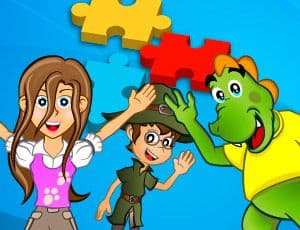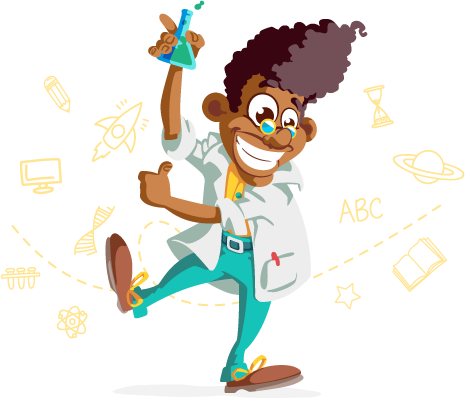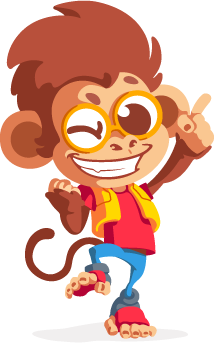Escola Games | Jogos Educativos
https://www.escolagames.com.br
Teacher's support sheet

Puzzle
Come and play with Puzzle School Games! Here you will find Dino, Elf and other characters that are part of our games.
Choose the difficulty level and show that you can assemble the puzzle in a few minutes.

Teacher's tips
Level of education: Elementary School - Early Childhood Education
Age: 05 to 08 years
The development of logical reasoning is fundamental for children. This ability makes the child know how to solve their problems, reflect and make good decisions. This is a challenging game that works essential skills for the development of students' logical thinking. There are more than ten scenarios that bring the option of the most difficult level with a daring proposal for children to “break their heads”, literally! [FIM-DICA]
Learner outcomes
Stimulate learning;
Stimulate problem-solving strategy skills;
Develop attention and logical thinking;
Develop motor coordination;
Promote memory exercise;
Develop different thinking skills such as: observe, compare, analyze and synthesize;
Analyze figures and expand the notions of composition and decomposition from the fragmentation of an image;
Perceive the different positions of fragmented figures in an image;
Analyze figures and expand the notions of composition and decomposition from the fragmentation of an image;
Perceive the different positions of fragmented figures in an image;
Stimulate cooperation among colleagues by promoting activities in pairs or groups;
Teachers' goals
Offer didactic games for the motor and cognitive development of children;
Offer the game as a didactic resource to fix the content worked in the classroom;
Expand students' knowledge;
Work with students concentration skills and logical reasoning;
Work attention and concentration;
Enable the development of different thinking skills, such as observation, comparison, analysis and the ability to synthesize;
Suggestions of approaches for the teacher
(Suggestion 1) Start work with the easy level proposals. First, each student must choose the scenario they want to set up. There are more than ten options with different themes. After the puzzle is ready, ask them to write down the time they spent on this first assembly. The proposal to set up the same scenario, but in a shorter time, will be instigating.
(Suggestion 2) Also propose plays in pairs, in which a colleague helps the other during the assembly. Sometimes a colleague coordinates the mouse, sometimes the other colleague of the pair.
(Suggestion 3) When realizing that the children are already able to master the easy level proposals well, launch the puzzle challenge at another level. Thus, the work follows a coherent didactic sequence that is a partner in the development of children. (Suggestion 1) Build assembly and assembly toys with reusable objects such as: shoe boxes, bottle caps, milk cartons, plastic cups, etc.
(Suggestion 4) Activity for 2nd grade: NUMBER HUNT: print a card with different numbers (plus or minus 5), these numbers will be the result of the mathematical operations that you will put on the board. The cards must be the same. Write the operations on the board and the students must quickly color the result. It is an activity similar to Bingo.
(Suggestion 5) Create a puzzle using popsicle sticks. Ask students to choose a drawing to paint, then students should write the word corresponding to the drawing. For this, the popsicle sticks must be glued to the back with adhesive tape. After writing and drawing separate and shuffle the sticks. Finally ask the students to make the correct union. This is an interdisciplinary activity with the Portuguese language discipline.
(Suggestion 6) We propose the same activity as above, but using mathematical operations instead of words and drawings.
(Suggestion 7) Create sheets with logical sequences with interdisciplinary subjects. Example: butterfly metamorphosis, rain, cake preparation etc...
More about the content
- The importance of electronic games for children's motor and cognitive development
Gradually electronic games are no longer just hobbies and becoming means of learning. The use of online games is an excellent resource that stimulates logical reasoning and motor coordination in children and adolescents. When exploited in the right way, these games make the user think strategically, and several cognitive skills are involved in the act of playing. Games have many benefits for the development of children, among them we can mention:
Development of good memory;
Motor coordination;
Quick thinking;
Attitude to make decisions;
Concentration;
Perception of patterns;
Emotional intelligence.
- Family games for strategy development and problem solving.
Hash
Chess
Domino
One
Monopoly
Checkers
